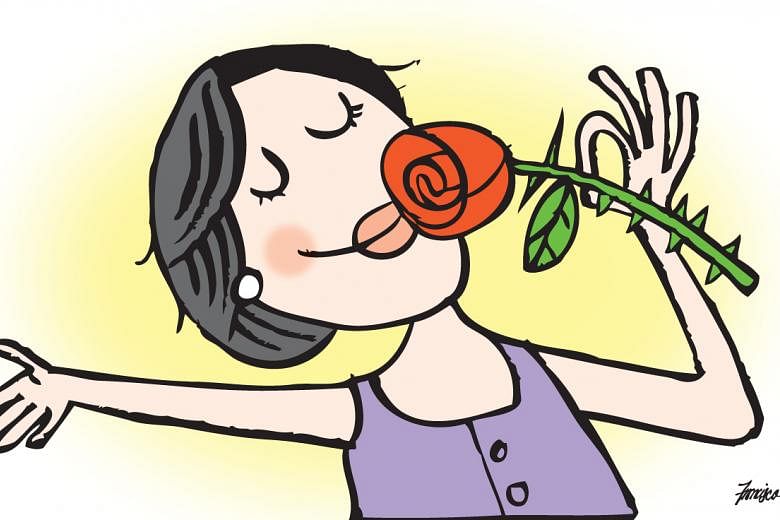There we were, the six of us, shooting the breeze on my patio.
One couple had been house- hunting in the area while the other pair went along. Then, they dropped by my place.
As they chatted about the pros and cons of the units they had viewed, my husband and I dished out nibbles and unsolicited advice.
"This is great," I suddenly thought. "Life is great."
It was two days after Christmas and we had just hosted a large lunch gathering at home for my mum's side of the family. Two of my cousins who live in the United States were back for a rare visit and we had a noisy reunion with the extended family.
It was fun but sapping. I've never been a good or relaxed hostess.
Still, a deep sense of contentment welled up within me.
I had lost an uncle to illness last year and two other family members were warded in the hospital on separate occasions. The low points were a reminder to not sweat the small stuff.
On that sticky Sunday afternoon, I felt a surge of gratitude as I basked in the joy of simple things. Grateful to be surrounded by kith and kin; grateful to be alive and well; grateful for the breeze that lifted my hair and caressed my face.
Perhaps it's an age thing. As the years slip by and it hits you that the end is not a future prospect you can't quite see yet, but a definite outcome you can't escape, you are more desperate to cherish what you have.
Or maybe I just happen to be on-trend.
If you haven't heard, mindfulness is so 2014. Gratitude is what's hot now.
The Telegraph reported last September that psychologists are heralding a "global gratitude renaissance".
Another British daily predicts that this year will see the rise of the gratitude diary - "writing down everything that you are thankful for, from the clean air you breathe to that glass of wine with dinner".
Oprah Winfrey is apparently an old hand at this: She has kept a gratitude journal for 20 years and describes it as the most important thing she has ever done.
Janice Kaplan, former editor- in-chief of Parade magazine, scored a New York Times bestseller with The Gratitude Diaries, a memoir published last year that documented how "a year of living gratefully" transformed her life, health and marriage.
If you prefer going paperless, there are reportedly more than 150 gratitude apps on iTunes to make counting your blessings a way of life.
There is even a World Gratitude Day, which is marked every year on Sept 21.
Then in church last weekend, I heard the G word again. Our Filipino priest reminded us - not for the first time - how blessed we are to live in Singapore.
"You have hot water. You can drink clean water straight from the faucet. Have you ever thought to be grateful for these things?"
Adopt a grateful heart for the new year, he urged.
Cultivating an attitude of gratitude is not just spiritually uplifting. Several studies have shown that it has a host of psychological benefits too.
In 2003, American psychology professor Robert Emmons co-authored groundbreaking research that showed spending a few minutes each day listing the things one was grateful for can have a whole range of positive outcomes.
Since then, other studies have affirmed the positive knock-on effects of expressing gratitude daily.
I Googled some of the findings and was sold.
Like most people, I say a silent prayer of thanks occasionally, when something reminds me of how lucky I am. But I've never consciously looked out for things or people to thank, not to mention record them.
The exercise turned out to be harder than I thought.
The biggest problem was taming my inner grouch. Each time I found something to be thankful for, what followed was often a nitpicky thought.
"Yay! Managed to get a parking spot very near the gate," I typed in the Gratitude 365 app on my phone on the first day, while waiting to pick my son up from school.
But what sprang next to mind was: "Gosh, it's so hot here. Why don't they plant trees along this stretch?"
There was also the challenge of overcoming my scepticism.
After three straight days of being grateful for waking up to a sunny morning, I wondered: Could gratitude sometimes be just a contrived or romanticised form of positive thinking?
But Prof Emmons argues that gratitude is not just about thinking nice thoughts and expecting good things. It requires you to recognise that you are dependent on or indebted to others at times, which might then prompt you to reciprocate in kind.
Indeed, one week into my gratitude journal, I've come to realise that making gratitude a priority doesn't mean having to ignore unpleasant events or suppress negative emotions.
It means I can be thankful for mercies big and small despite the lows, which in turn lifts my mood.
The 19th-century French critic and novelist Alphonse Karr summed up this mindset beautifully: "Some people grumble that roses have thorns. I am grateful that thorns have roses."
So to all the thorns in my life, thank you. Without you, I might never have seen the roses for what they are really worth.


